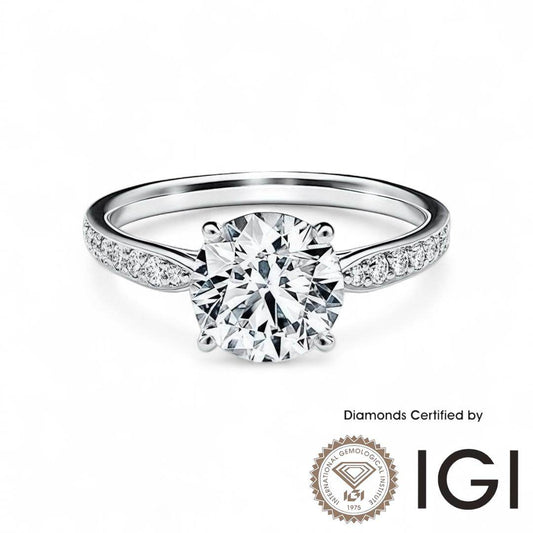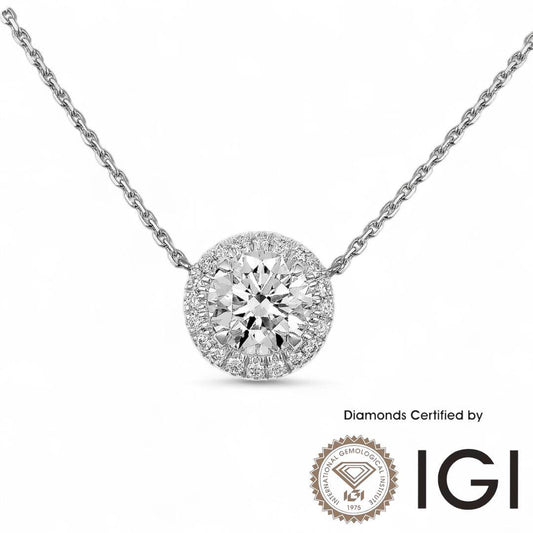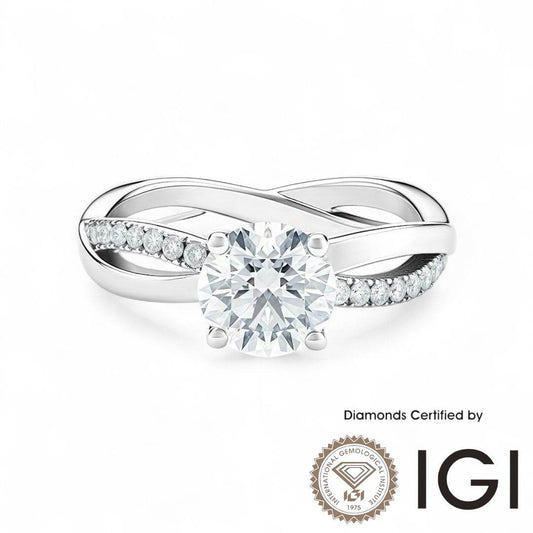Japanese Women’s Favorite Diamond Rings (2025): Carat Trends, Iconic Styles & Eternity Band Guide
By MadisonDia — Updated Oct 10, 2025.
A thorough market-backed guide to carat preferences, styling influences from Tiffany, Cartier, and Harry Winston, and the rise of self-purchased and kyabakura-driven diamond demand in Japan.
1. Introduction — Why Diamonds Still Matter in Japan
Diamonds in Japan represent both aesthetic harmony and social symbolism. Traditionally prized for subtlety and craftsmanship, the market has shifted in recent years: accessibility and transparency introduced by high-quality lab-grown diamonds have changed buying behavior. Today’s Japanese buyers care about cut quality, brand significance, and social meaning — and many now choose larger carat sizes than previous generations.
2. Carat Trends — From 1ct to Statement Sizes (2025)
Lab-grown diamonds have made diamond ownership more affordable and transparent. This new price reality has a direct effect on preferences: Japanese buyers increasingly pick larger stones because they can now access higher carat weights at a fraction of mined-diamond prices.
2.1 Younger Buyers, Self-Purchase Movement & MadisonDia Survey
Younger Japanese women are leading a notable shift — they buy diamonds for themselves as expressions of independence, achievement, and style. They no longer wait for a partner to present a ring; instead, they choose stones that reflect personal success or social standing.
Lab-grown diamonds lower the cost barrier. As a result, many women opt for larger sizes to make a visible statement: according to MadisonDia’s internal survey, the average desired size among Japanese women in 2025 is approximately 1.5 carats. Reasons cited include affordability (lab-grown pricing), daily-wear practicality with modern settings, and the ability to showcase social status without the mined-diamond premium.
“A 1.5 ct lab-grown diamond offers both presence and ethical transparency — the perfect combination for the modern Japanese woman.” — MadisonDia Jewelry Specialist
2.2 キャバクラ Influence — Visibility & Status
The キャバクラ scene (hostess culture) continues to shape luxury consumption in Japan. Many hostesses invest in eye-catching diamond rings as part of their professional and social image — stronger visibility equates to higher perceived status among patrons.
MadisonDia’s market observations indicate that purchases influenced by kyabakura preferences trend larger: hostesses commonly buy rings in the ~2.0 carat range, prioritizing visual impact and high clarity for maximum sparkle under club lighting. These purchases influence broader aspirational consumers who associate larger stones with prestige.
3. Styles & Brand Inspirations (3.1–3.4)
Japanese customers often look to iconic global designs for inspiration. Below are the three most influential aesthetic directions and how they translate locally.
3.1 Tiffany & Co. — Soleste / Tiffany Setting Inspirations
The Tiffany Soleste and classic Tiffany Setting are beloved for their exceptional light return and clean silhouettes. Many Japanese women choose halo or soleste options because they enlarge perceived size while staying elegant. These designs pair especially well with slim bands preferred in Japanese styling.

3.2 Cartier — 1895 Solitaire & Love Collection Influence
Cartier’s 1895 Solitaire and Love motifs appeal to those who value architectural proportion and brand heritage. The Love ring’s iconic motif and the 1895’s minimalist claws offer versatility — appropriate for both formal kimono wear and modern office attire.

3.3 Harry Winston — Classic Winston™ & High-Visibility Glamour
Harry Winston’s signature settings and emphasis on center-stone brilliance inspire buyers seeking prestige. Men often favor Winston-style rings for proposals; women attracted to bold glamour also choose similar looks, especially for milestone self-purchases.

Comparison Chart — Tiffany vs Cartier vs Harry Winston
| Brand | Signature Trait | Typical Look | Why Popular in Japan |
|---|---|---|---|
| Tiffany & Co. | Maximum brilliance, clean solitaire silhouette | Solitaire / Soleste halo | Elevates perceived size gracefully; suits petite hands |
| Cartier | Architectural elegance, subtle branding | 1895 Solitaire / Love ring | Timeless, versatile — fits traditional and modern styles |
| Harry Winston | Center-stone emphasis, luxury craftsmanship | Classic Winston™ Solitaire / halo variations | High prestige; visually striking under spotlighting |
3.4 MadisonDia Custom-Made Service — Designer-Look, Personal Fit
MadisonDia offers a full custom-made diamond ring service so customers can design a ring inspired by Tiffany, Cartier, or Harry Winston while ensuring unique personal details and a perfect fit.
Our artisans work with IGI-certified artificial diamonds and offer flexible metal choices, band widths, and setting styles. If you love the look of a Tiffany Soleste or Cartier 1895 but want an individualized ring, visit our custom design page to start the process.
For shoppers browsing ready-made options, our curated collection of single-stone and designer-inspired rings is available here: MadisonDia Diamond Ring Collection.
4. Eternity Band Guide — Pairing, Carat, and Settings

Eternity bands are both sentimental and fashionable in Japan. Women frequently pair a half-eternity band with a larger solitaire to combine comfort and continuous sparkle.
- Half Eternity: Most popular for daily wear — diamonds across the top half only.
- Full Eternity: Luxurious and symbolic, best reserved for special occasions or careful daily use.
- Settings: Shared-prong and U-settings are trending for maximizing visible brilliance without overly thick bands.
Recommended total carat weight for a tasteful but impactful look: 0.8 – 1.8 ct total for half-eternity and 1.5 – 3.0 ct total for full eternity, depending on stone size and band width.
FAQ — Frequently Asked Questions
Q1. Are Japanese women choosing bigger diamonds now?
A: Yes. With lab-grown diamonds reducing cost and increasing transparency, many Japanese buyers choose larger sizes. MadisonDia’s internal survey shows an average desired size of about 1.5 ct among women in 2025.
Q2. Why are single women buying diamonds for themselves?
A: Self-purchase reflects independence, career success, and personal celebration. Lab-grown diamonds make larger, high-quality stones affordable for daily wear and social visibility.
Q3. What influence does キャバクラ culture have on diamond purchases?
A: Hostess culture emphasizes visibility and status. Hostesses often select larger stones (around 2.0 ct) to stand out under club lighting; this trend raises aspirational demand among other consumers.
Q4. Can MadisonDia make a ring similar to Tiffany or Cartier?
A: Yes. MadisonDia’s custom design service can create rings inspired by these iconic looks while producing unique, legally distinct pieces using IGI-certified artificial diamonds.
Q5. Where can I shop MadisonDia’s designer-inspired rings?
A: Browse our curated collection here: MadisonDia Diamond Ring Collection.





